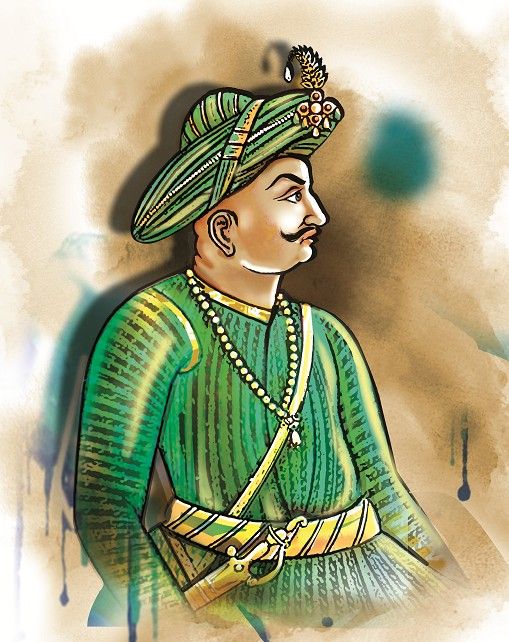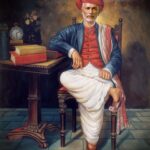The Life and Legacy of Tipu Sultan: History, Achievements, and Impact
Tipu Sultan, famously known as the “Tiger of Mysore,” was a fearless ruler, brilliant strategist, and innovative reformer who left a significant mark on Indian history. As the ruler of the Kingdom of Mysore, he valiantly resisted British colonial forces, earning him a place as one of India’s earliest freedom fighters. Let’s explore the life, achievements, and legacy of Tipu Sultan.
Early Life and Background
Tipu Sultan was born on November 20, 1751, in Devanahalli (near modern-day Bengaluru), to Sultan Hyder Ali and Fatima Fakhr-un-Nisa. His father, Hyder Ali, was a military leader who later became the ruler of Mysore, and his mother was a deeply religious woman who shaped Tipu’s early values.
Tipu was named after a revered saint, Tipu Mastan Aulia. From a young age, he was trained in military tactics, administration, and statecraft. His education included Persian, Arabic, and Urdu, along with lessons in science, mathematics, and history.
Rise to Power
Tipu Sultan ascended the throne of Mysore in 1782 after the death of his father, Hyder Ali. He inherited a kingdom engaged in conflict with the British East India Company. Tipu continued his father’s legacy, modernizing the army and strengthening Mysore’s position as a significant power in South India.
Achievements and Innovations
Tipu Sultan is remembered for his remarkable leadership and contributions in various fields:
- Military Strategy:
- Tipu was a master of guerrilla warfare and employed innovative tactics to outmaneuver larger British forces.
- He used rockets effectively in battles, making Mysore one of the first kingdoms to deploy advanced military technology.
- Economic Reforms:
- He promoted agriculture, trade, and industry, making Mysore a prosperous state.
- He introduced new coinage and supported the development of silk production, which laid the foundation for Karnataka’s silk industry.
- Administrative Efficiency:
- Tipu Sultan implemented land revenue reforms and streamlined taxation systems, benefiting farmers and traders alike.
- He modernized irrigation systems, boosting agricultural productivity.
- Religious Tolerance:
- Although a devout Muslim, Tipu was known to respect other religions. He built temples, donated to Hindu shrines, and employed people from diverse communities in his administration.
Resistance Against the British
Tipu Sultan is best known for his fierce resistance against British colonization. Over his reign, he engaged in four Anglo-Mysore Wars:
- First and Second Wars: His father, Hyder Ali, initiated these wars, and Tipu played a significant role as a commander.
- Third War (1789–1792): Although Tipu fought valiantly, he was forced to sign the Treaty of Srirangapatna, ceding significant territories.
- Fourth War (1799): Tipu Sultan died defending his capital, Srirangapatna, against the British forces, famously proclaiming, “Better to live one day as a tiger than a hundred years as a sheep.”
Daily Life and Values
Tipu Sultan was known for his disciplined and austere lifestyle. His day typically began with prayers and state meetings. He personally supervised military training and administrative tasks, ensuring efficiency in governance.
Tipu’s love for science and technology was evident in his fascination with European innovations. He encouraged technological advancements and maintained a library with books on diverse subjects, reflecting his curiosity and intellectual pursuits.
Legacy and Impact
Tipu Sultan’s contributions to Indian history are immense:
- National Hero: He is celebrated as one of India’s earliest freedom fighters who challenged British dominance.
- Technological Pioneer: Tipu’s use of rockets inspired advancements in military technology.
- Economic Visionary: His policies helped Mysore achieve economic prosperity, laying the groundwork for modern Karnataka’s development.
Observance and Celebrations
Tipu Sultan’s legacy is commemorated annually on Tipu Sultan Jayanti, especially in Karnataka. Cultural programs, historical reenactments, and public discussions highlight his achievements and sacrifices. His tomb at Srirangapatna remains a site of homage for admirers.
Interesting Facts About Tipu Sultan
- The Tiger Emblem: Tipu adopted the tiger as his symbol, representing courage and strength. His throne and artifacts featured tiger motifs.
- Rocket Technology: He developed iron-cased rockets, which inspired later British advancements in military weaponry.
- Alliance with Napoleon: Tipu sought alliances with France and even exchanged letters with Napoleon Bonaparte to counter British power.
- Multilingual Education: Tipu was fluent in multiple languages, including Kannada, Persian, and French.
- Library: His library contained thousands of books on science, engineering, and literature.
FAQs
1. Why is Tipu Sultan called the “Tiger of Mysore”?
The title reflects his courage and valor in resisting British forces and his adoption of the tiger as a personal symbol.
2. What was Tipu Sultan’s greatest achievement?
His modernization of the Mysore army, use of advanced rocket technology, and steadfast resistance to British imperialism are considered his greatest accomplishments.
3. Was Tipu Sultan a religiously tolerant ruler?
Yes, He was known for his inclusive policies, supporting temples and employing people from various communities.
Significance in Modern Society
His life serves as a reminder of the importance of courage, innovation, and resistance to oppression. His efforts to modernize Mysore, promote economic growth, and defend sovereignty offer valuable lessons in leadership and governance.
Wishing Tipu Sultan’s Legacy Forward
His vision and bravery remain an enduring source of inspiration. Wishing to honor his legacy means embracing values of innovation, unity, and unwavering determination in the face of challenges.
Final Thoughts
He was not just a warrior; he was a visionary leader who stood for justice, progress, and sovereignty. His contributions to Indian history and his unyielding resistance to colonization ensure that his legacy will never be forgotten.










